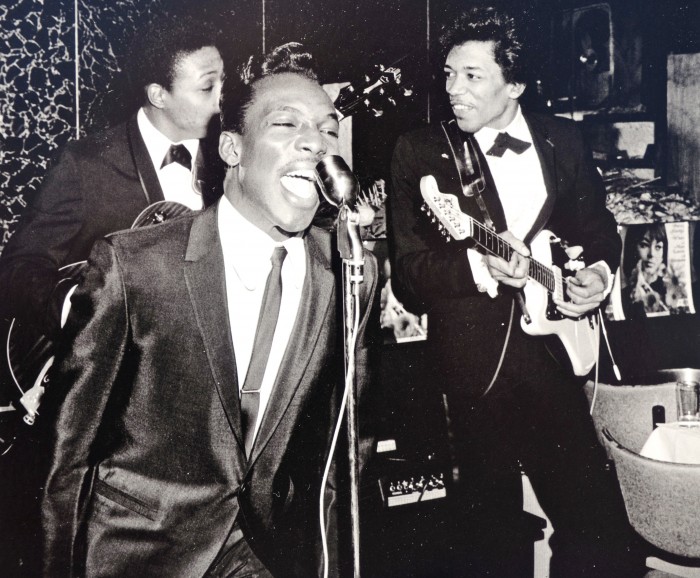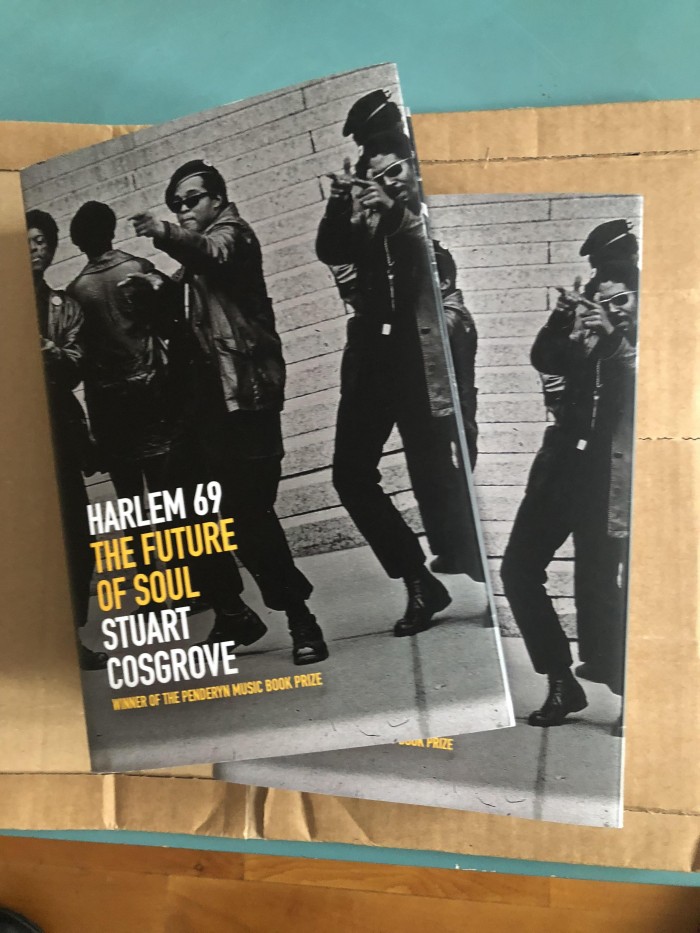×
Fans of 'The most petty and ill-informed football show on radio' (their words, not mine) 'Off the Ball', may not be aware that co-host Stuart Cosgrove has a parallel carer as a music writer. He's been writing about soul, funk and hip-hop for nearly forty years now, culminating in a trilogy of non-fiction books of which 'Harlem 69: The Future of Soul' is the final part.
I'd really enjoyed the previous instalments, particularly the second book 'Memphis 68'. It really re-ignited my love of southern soul music and is one of  the reasons I'm now sitting on a plane to Nashville with my girlfriend Jo, about to start a road trip that will take in the legendary Stax records. One of the things I love about a long flight (other than it gets me where I've got to go), is that it gives me a chance to catch up on some reading. A good book turns all those minor annoyances about air travel into an opportunity to get a few more pages under your belt. Traffic moving a little bit slowly from the Inverkeithing Park and Ride to Edinburgh airport? Nae sweat, now I know all about Fat Jack, the ostentatious Harlem drug dealer and musical entrepreneur and his Rojac Records. Standing around gormlessly holding my hand luggage while my financial betters take advantage of priority boarding to pile on the plane ahead of us? Braw, it just gives me more time to learn how Donny Hathaway changed the path of soul music with his zeitgeist-defining funk belter 'The Ghetto'.
the reasons I'm now sitting on a plane to Nashville with my girlfriend Jo, about to start a road trip that will take in the legendary Stax records. One of the things I love about a long flight (other than it gets me where I've got to go), is that it gives me a chance to catch up on some reading. A good book turns all those minor annoyances about air travel into an opportunity to get a few more pages under your belt. Traffic moving a little bit slowly from the Inverkeithing Park and Ride to Edinburgh airport? Nae sweat, now I know all about Fat Jack, the ostentatious Harlem drug dealer and musical entrepreneur and his Rojac Records. Standing around gormlessly holding my hand luggage while my financial betters take advantage of priority boarding to pile on the plane ahead of us? Braw, it just gives me more time to learn how Donny Hathaway changed the path of soul music with his zeitgeist-defining funk belter 'The Ghetto'.
Although the book is set in Harlem in the year 69, Cosgrove doesn't limit himself either geographically or chronologically. When I interviewed Cosgrove last month he mentioned that he had considered setting one of the books in Chicago, but opted for Memphis instead. However, this book has a strong Chicago connection thanks to the presence of Donny Hathaway and Aretha Franklin. As a huge Curtis Mayfield fan, I was fascinated by the sections of the book that concerned Hathaway, particularly in his fallout with his former boss at Curtom records.
 Like the preceding two books, 'Harlem 69' is as much about the story of the civil rights movement as it is about soul music, and much of the book focuses on the Black Panthers. Cosgrove obviously puts a lot of thought into the year and location he chooses to document. New York in 1969 is a compelling choice as it is so eventful that it lends the book a novelistic edge that would appeal to non-soul music obsessives (if such a person exists!). There is a genuine sense that 1969 was a bit of a turning point. The book is subtitled 'The Future of Soul' and some of the music that was produced that year would plant the seeds of styles like hip-hop, disco and psychedelic soul.
Like the preceding two books, 'Harlem 69' is as much about the story of the civil rights movement as it is about soul music, and much of the book focuses on the Black Panthers. Cosgrove obviously puts a lot of thought into the year and location he chooses to document. New York in 1969 is a compelling choice as it is so eventful that it lends the book a novelistic edge that would appeal to non-soul music obsessives (if such a person exists!). There is a genuine sense that 1969 was a bit of a turning point. The book is subtitled 'The Future of Soul' and some of the music that was produced that year would plant the seeds of styles like hip-hop, disco and psychedelic soul.
***
Cosgrove's 'Harlem 69' features some influential soul stars who were moving and shaking beyond 110th Street as the sixties drew to a close. For me though, the books greatest strength lies in the way it breathes life into the background of the areas lesser known characters. Here's just a handful of my favourites.
I kill a man and most forgive me... I love a man and many say this makes me an evil personEmile Griffith- “CHAMPION, GENTLEMAN, SEXUAL pioneer” — these were the words used to describe Emile Griffith by boxing writer Robert Ecksel, after the former world champion passed away at the age of 75 on 23 July 2013. Like many of lives in this book, his was coloured by sadness. In a 1962 title bout with Benny Paret, he was so enraged with his opponents homophobic taunting at the weigh-in that he beat him unconscious in the 12th round. Paret never regained consciousness and died 10 days later in hospital. Griffith was traumatised and was haunted by the event for the rest of his life. He was a sensitive, compassionate man who struggled to be accepted by his community due to his sexual orientation. He once remarked: 'I kill a man and most forgive me... I love a man and many say this makes me an evil person.'
Afeni Shakur- One of the main events of 'Harlem' 69 is the trial of 'The Panther 21', members of the Black Panthers who stood accused of carrying out bombings in New York. Shakur chose to represent herself in court. Her reason was that if she was convicted, she would be the one serving jail time, not the lawyers. Heavily pregnant (with a child who would grow up to be Tupac Shakur), and facing a 300-year prison sentence, Shakur interviewed witnesses and argued in court. She and the others in the "Panther 21" were acquitted in May 1971 after an eight-month trial.
Jane Alpert- A journalist for the radical 'Rat Subterranean News' and a member of the far left militant organisation 'Weather Underground'. Alpert was charged with bombing eight government and corporate office buildings during a three-month bombing spree. Her boyfriend Sam Melville was also a member of 'Weather Underground' and died in a riot at Attica prison in 1971.
Arthur Conley- A great soul singer best known for the referential hit 'Sweet Soul Music'. He never quite gained the commercial success of the stars it namechecked achieved. A gay man, like Griffith he never felt truly accepted by his community and peers. In 2014, rock historian Ed Ward wrote, "[Conley] headed to Amsterdam and changed his name to Lee Roberts. Nobody knew 'Lee Roberts,' and at last Conley was able to live in peace with a secret he had hidden—or thought he had—for entire career: he was gay. But nobody in Holland cared".
Walter Vandermeer- When Walter Vandermeer was found dead in the bathroom of a Harlem tenement he was the youngest ever victim of a heroin overdose. At just 12 years old it was initially assumed that his first hit had just been too much for him. However, the truth was sadder still. Walter had been sniffing glue since the age of 6 and at the time of his death had been using and dealing heroin since the age of 10. His clothing at the time of his death, a snoopy sweatshirt, brought into sharp focus the fact that despite his street smarts he was still just a little boy.
Harlem 69: The Future of Soul published by Polygon is out now. Available from all good bookshops
Perth Festival of the Arts has joined forces with its 2020 artists to create a 10-day online celebration to ‘celebrate the arts together'.
May 21st Thursday 2020
Dougie Maclean's new Perthshire festival this summer: Cardney Concerts.
March 18th Wednesday 2020
Party at The Park, the South Inch, 27th and 28th June, will feature fantastic live performances from The Charlatans and many more!
March 12th Thursday 2020